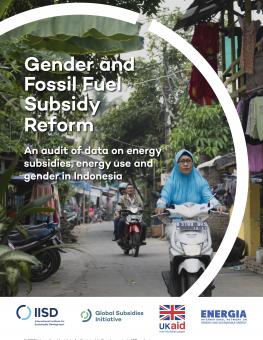
Gender and Fossil Fuel Subsidy Reform: An audit of data on energy subsidies, energy use and gender in Indonesia
This study provides an initial investigation into LPG subsidies and their reform and gender in Indonesia by examining the available data on household use of energy and relevant gender issues.
The Government of Indonesia is considering reform of its consumer subsidies for liquefied petroleum gas (LPG) due to its rising fiscal cost: IDR 25 trillion (USD 1.9 billion) in 2016: around half of its total energy subsidy expenditure.
Subsidized 3-kg LPG cylinders are currently available to all citizens. Reforms are likely to target the subsidy to the poor or replace it with cash transfers through the social assistance system.
Subsidized LPG is an important energy source for the 50 per cent of poor and near-poor households that use it in Indonesia. Women in these households are more vulnerable than their male counterparts to the impact of any price increases in LPG. Poor women may be affected economically by: 1) rising LPG prices eroding household budgets, 2) reducing scope for leisure or economic activity due to greater time spent cooking or collecting fuel or 3) increased input costs to small businesses.
This study provides an initial investigation into LPG subsidy reform and gender in Indonesia by examining the available data on household use of energy and relevant gender issues. The focus is on the poor and near-poor, which comprise the bottom 35 per cent of the population by income. Information is derived from five national household surveys and a review of relevant literature.
This data audit aims to do two things. First, it gathers general data on the status of women in Indonesia. This demonstrates the degree of gender equity and whether women face disadvantages. Second, the report examines energy use, particularly by poor women, to establish whether women are more likely to be affected by subsidy reform. The audit aims to establish a baseline and to identify data gaps.
You might also be interested in
Switching Fossil Fuel Subsidies in Indonesia to Support a Green Recovery
This brief looks at how Indonesia can start actively promoting renewable energy by removing the existing hurdles to its deployment—such as unattractive renewable energy feed-in tariffs and land and infrastructures barriers—and switching public support from fossil fuels to renewables to meet the country’s clean energy targets.
Indonesia's fiscal support for fossil fuels too large: IISD
The Indonesian government's fiscal support for fossil fuels is still too large, so it has the potential to slow down the energy transition and drain the public budget, according to the International Institute for Sustainable Development (IISD).
How Indonesia's Incoming President Can Advance the Transition to Clean Energy
With Prabowo Subianto inaugurated as Indonesia’s President, speculation abounds about the new administration’s commitment to the clean energy transition and climate targets, given Prabowo’s positioning as the “continuity candidate.” The question is, what, exactly, will be continued?
At long last, Canada restricts oil and gas subsidies (except for all the loopholes)
Environment and Climate Minister Steven Guilbeault has unveiled detailed plans to phase out "inefficient" oil and gas subsidies, based on guidelines released yesterday morning that take effect immediately and are meant to fulfill a 14-year-old pledge by G20 countries.